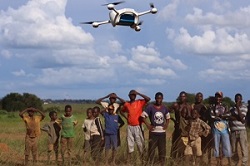Promising Innovation to Overcome Treatment & Care Obstacles
In an experimental first, the Malawi government and UNICEF tested the use of drones to explore cost-effective ways of reducing waiting times for HIV testing of infants. The test, using simulated samples, has the potential of providing a high-speed delivery system for HIV diagnosis. The week-long test of this innovative approach is intended to address challenges of providing HIV diagnosis results and treatment to hard-to-reach rural areas
Bad roads, poor transport, and lack of funds to access existing transport often force Africans to wait months for HIV test results and critical medical supplies. Drones would dramatically reduce these waiting times.
This innovation could be the breakthrough in overcoming transport challenges and associated delays experience by health works in remote areas of Malawi, said Mahimbo Mdoe, UNICEF representative.
According to Mdoe, in 2014, nearly 40,000 children in Malawi were born to HIV-positive mothers. Quality care for these children depends on dearly diagnosis.
In 2014, about 10,000 children in Malawi died from HIV-related diseases and less than half of all children were on treatment. Today it takes an average of 11 days for samples to get from a rural health center to the central laboratory for testing, and up to eight weeks for results to be delivered back. The longer the delay between test and delivered results, the more detrimental it is to the patient.
One challenge is persuading African rural communities to accept new technology they have never seen. The drone test was preceded by demonstrations allowing villagers to see and touch the drones. Drones were also dismantled so people could see how they carried cargo. “It’s very important that they are not fearful of the technology,” said UNICEF communications specialist Angela Travis. “But all has gone without a hitch. . . .The reaction has been very positive.”
Initial delivery results were also positive and following the drone test cost will be evaluated and compared to UNICEF’s expenditure of $15 million annually just for delivery of blood samples.
“Malawi has pioneered a number of innovations in the delivery of HIV services, “said Malawi Minister of Health Dr. Peter Kumpalume. “We believe our partnering with UNICEF to test drones is another innovation and will help in our drive to achieve the country’s goals in HIV prevention and treatment.”

 Today is a day to celebrate the amazing results of the last 15 year fight against malaria. World Malaria Day commemorates the date in 2000, when 44 African leaders met in Nigeria and committed their countries to reducing malaria-related deaths.
Today is a day to celebrate the amazing results of the last 15 year fight against malaria. World Malaria Day commemorates the date in 2000, when 44 African leaders met in Nigeria and committed their countries to reducing malaria-related deaths.